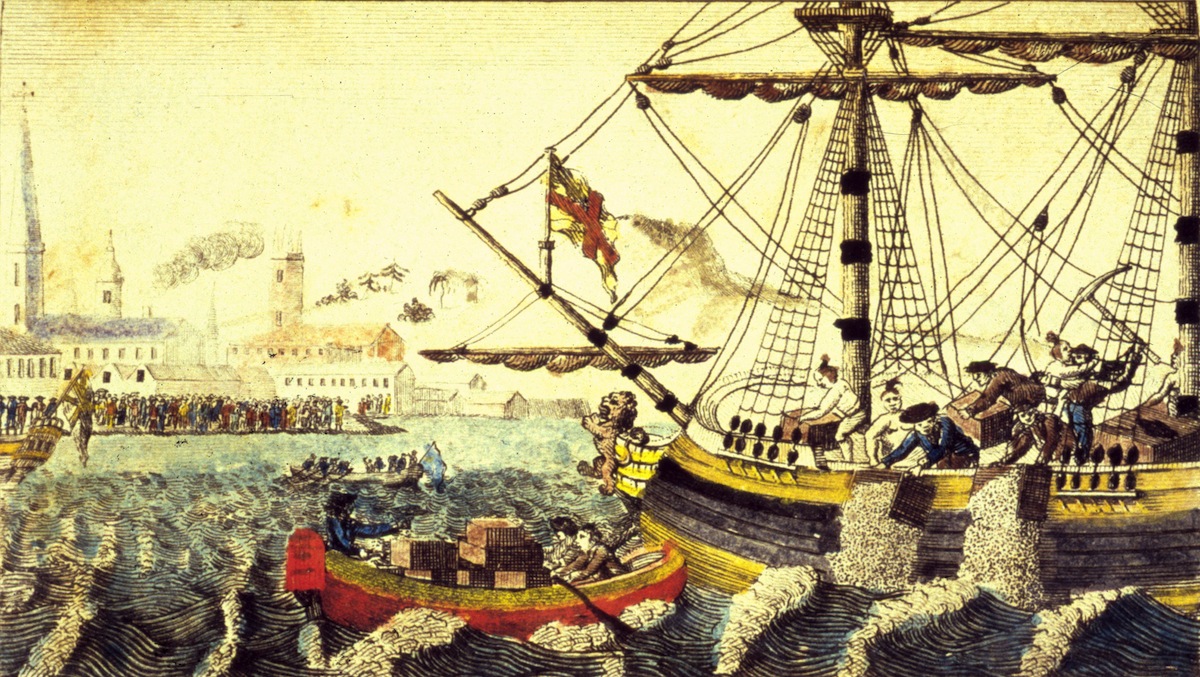
Members of today’s Tea Party movement embrace as kindred spirits the colonists who turned Boston Harbor into a teapot 241 years ago. And while it’s true that both groups formed around a robust opposition to the government in power and an equally vigorous objection to the taxes it levied, it would be a mistake to say that the Boston Tea Party was triggered by a tax hike.
On this evening, Dec. 16, in 1773, dozens of colonists boarded three ships laden with East India Company tea and dumped the entire stock — 45 tons of tea, worth roughly $1 million in today’s economy — into the harbor to protest Parliament’s recent Tea Act. The act, however, didn’t increase taxes: It lowered the price of tea by allowing the struggling East India Company to sell directly to colonists without first stopping in England. This cut out colonial middlemen and essentially gave the company a monopoly on tea sales.
So, although organizers of the original tea party echoed the popular refrain of “No taxation without representation,” many were motivated by a personal interest that continues to motivate 241 years later: profit. Boston’s wealthy merchants, some of whom made a fortune smuggling Dutch tea, stood to lose big when the Tea Act was passed. John Hancock, one of the main agitators behind the tea party, was among them.
Ahough the Boston Tea Party has become synonymous with patriotism, not all of early America’s top patriots were on board. The protest appalled many colonists with its destructiveness and waste, according to Harlow Unger, the author of American Tempest: How the Boston Tea Party Sparked a Revolution. “Far from uniting colonists, the Tea Party had alienated many property owners, who held private property to be sacrosanct and did not tolerate its destruction or violation,” Unger wrote.
Ben Franklin suggested to Hancock and co-agitator Samuel Adams that they reimburse the East India Company for the lost tea. He wrote, in a letter from London shortly after the protest, “I am truly concern’d, as I believe all considerate Men are with you, that there should seem to any a Necessity for carrying Matters to such Extremity, as, in a Dispute about Publick Rights, to destroy private Property.”
George Washington was similarly disapproving. His take on the Boston Tea Party clashes with the modern-day tea party’s more reverent view — and with their claim to channel the beliefs of the Founding Fathers.
When a contemporary Tea Partier, on a visit to Colonial Williamsburg, brought up the topic with a historical interpreter dressed as Washington, he was surprised by the answer, according to a 2010 Washington Post story. “…Asked whether the Boston Tea Party had helped rally the patriots, Washington disagreed with force,” the Post reported. “The tea party ‘should never have occurred,’ he said. ‘It’s hurt our cause, sir.’”
Read more about the modern Tea Party here, in TIME’s archives: Why the Tea Party Movement Matters
More Must-Reads From TIME
- The 100 Most Influential People of 2024
- The Revolution of Yulia Navalnaya
- 6 Compliments That Land Every Time
- What's the Deal With the Bitcoin Halving?
- If You're Dating Right Now , You're Brave: Column
- The AI That Could Heal a Divided Internet
- Fallout Is a Brilliant Model for the Future of Video Game Adaptations
- Want Weekly Recs on What to Watch, Read, and More? Sign Up for Worth Your Time
Contact us at letters@time.com